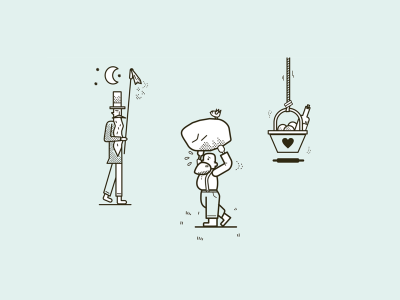
Grumpy? Sociable!
Do we need customs? “Yes!” says our columnist, who is very much on trend with this opinion.
To call it a revelation would be a slight exaggeration, though I was astonished for a moment when farmer Hermann “Hermi” Röllin, under one of his 300 cherry trees in blossom, told me how many different varieties grow on his farm: Wölflisteiner, Zimbeler, Benjaminer, Langstieler, Buholzer, Rote Schüttler, Tüfebächler, Baarburger, Dolleseppler – or to put it simply and succinctly: Kordia, Magda, Zopf and Star. That’s like music to my ears!
Cherries have been cultivated in Zug for 600 years. The Zuger kriesymerckht (Zug cherry market) has existed since 1627 and the Zuger Chriesigloggä (Zug cherry bell), a type of permission bell that signals the official start of the cherry harvest, can be traced back to the year 1711. People are justifiably slightly proud. But as far as customs are concerned, I am also picky! Not being a religious person, I didn’t follow the pilgrimage to Einsiedeln; however, I couldn’t pass up the invitation to enjoy Zug’s Rötel (Arctic char) fish speciality. The bizarre single-axle races in mountain communities are virtually compulsory, where chubby-cheeked guys step on the gas, with the crowd becoming intoxicated by the petrol and diesel fumes and the completely insane compete in the motor-throwing contest with clumps of mud on their shoes.
This gives rise to some questions: How old does a custom have to be in order for it to be recognised as such? And when is an annual event merely a recurring occasion? Where is the line between folklore and commerce? Tourism has long-since recognised the economic potential of exploiting customs and reshaped and expanded many existing customs in line with commercial criteria – some right up to the pain barrier – which was brought home to me when I visited the Zurich Knabenschiessen (target shooting festival) many years ago. I went once – and never again!
In the Duden dictionary, a custom is rather generously defined as “a habit that has developed within a community to become established in certain forms”. Hence the dictionary includes flag-waving and Alpine horn blowing equally with handicrafts, culinary specialities or – to name a less popular example from the place where I live Zug – the annual ringing of the peace bell in the capuchin tower that commemorates the end of World War II every year on 8 May. It is precisely this lovely, inconspicuous “little custom” that shows that the degree to which a custom is taken seriously is not measured by the size of the audience or sales figures it generates. Otherwise the world’s largest techno festival, the Zurich Street Parade, which has taken place since 1992, would be the custom to end all customs.
I take great pleasure in events that are down-to-earth and sociable. The Alpine cheese market in Muotathal, the Chestnut festival in Greppen, the Yodeler festival in the Ruodisegg restaurant on the Rigi. The finest! Many of these customs contribute to a sense of identity and obey heavily ritualised and sometimes rigid forms. On the eve of the feast of St Nicholas, on the Klausjagen (Nicholas chase) in Küssnacht – scandal! – women are still not allowed to participate. Yes, what kind of world are we living in here? The proposal of one of the locals, submitted to the general assembly of the St Nicholas committee in 2015, to allow women to join in the procession in future, failed miserably (with 20 votes in favour to 720 votes against).
Many of these customs contribute to a sense of identity and obey heavily ritualised and sometimes rigid forms.
What can you do? We are welcome as spectators, and I am a regular! I get extremely excited when, at 8.15 p.m. precisely, the saluting gun is fired and the lights go out and the geislechlepfer determinedly crack their whips in time with each other on the village square to drive out spirits, when the lantern bearers appear from the graveyard, followed by a triad of trumpets and trombones, then – finally – the Nicholas chasers pass by with their scarily threatening cowbells and beating and then finally, at the end of the procession, the incessant, monotone “Tö, tö, tööö” of the cowhorn players sounds.
“Under the gowns is the musty odour of 1,000 years,” was the slogan of the 1968 movement, claiming that academics and their institutions had not changed for 1,000 years. It despised traditions and customs as the detritus of the past and saw them as the embodiment of a society frozen in conventions. Of course, the likes of us have to ask: Am I not critical enough, and should I keep away from traditional events for socio-political considerations? Madness! With my enthusiasm for Swiss folk culture I am fully on trend, according to Pro Helvetia. They have been noticing an upturn for years.
Back to the cherries. I have been helping my neighbour, farmer Albert “Bärti” Weiss, with the cherry harvest for a few days in early summer every year for three years. What a privilege, to put on our walking boots and shorts and, with our cherry baskets around our waists, climb the handmade wooden ladder to pick the ripe fruit. How peaceful and quiet it is to while away time in the treetops. What a view the tall trees give you. How refreshing blows the gentle breeze between the branches and how pleasantly shaded it is thanks to the lush leaves. No-one disturbs you and there’s no mobile phone ringing.
Even a wellness weekend in a luxury resort cannot compete with the experience offered by such a spectacularly unspectacular activity as this. And as if these glad tidings weren’t already enough, at the same time, you are also making a small contribution to keeping this centuries-old tradition alive so that in the future, there will also be local cherries!



